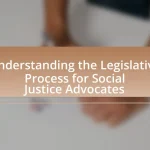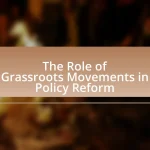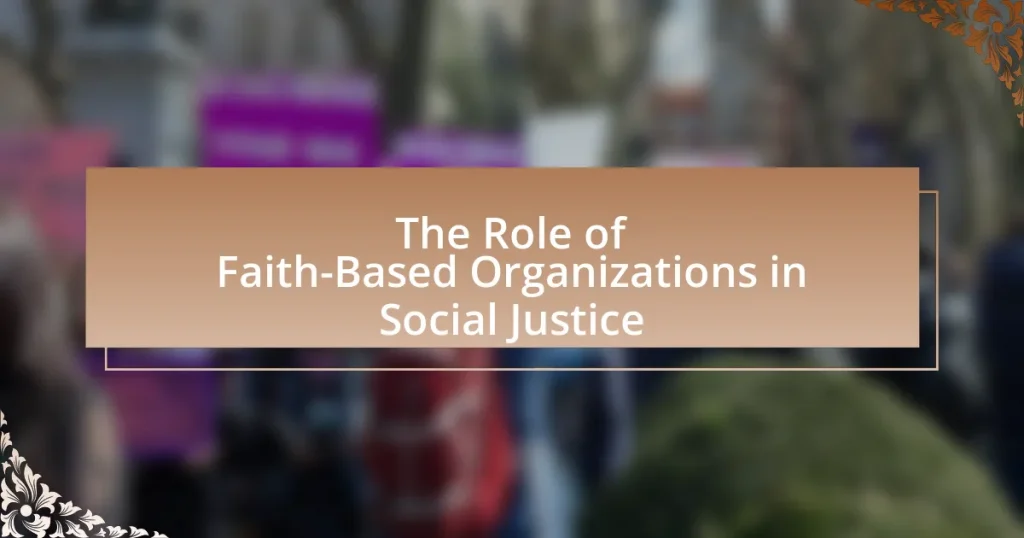Faith-based organizations play a vital role in promoting social justice by advocating for marginalized communities and addressing systemic inequalities. They mobilize resources, provide essential services, and engage in advocacy efforts that align with their moral and ethical beliefs, focusing on issues such as poverty alleviation, racial equality, and access to healthcare. These organizations leverage their community networks to influence policy changes and foster social equity, while also facing challenges such as limited resources and political opposition. Interfaith collaboration enhances their impact, allowing diverse religious groups to unite in addressing social issues effectively. Through education and strategic partnerships, faith-based organizations can further strengthen their efforts in advancing social justice initiatives.
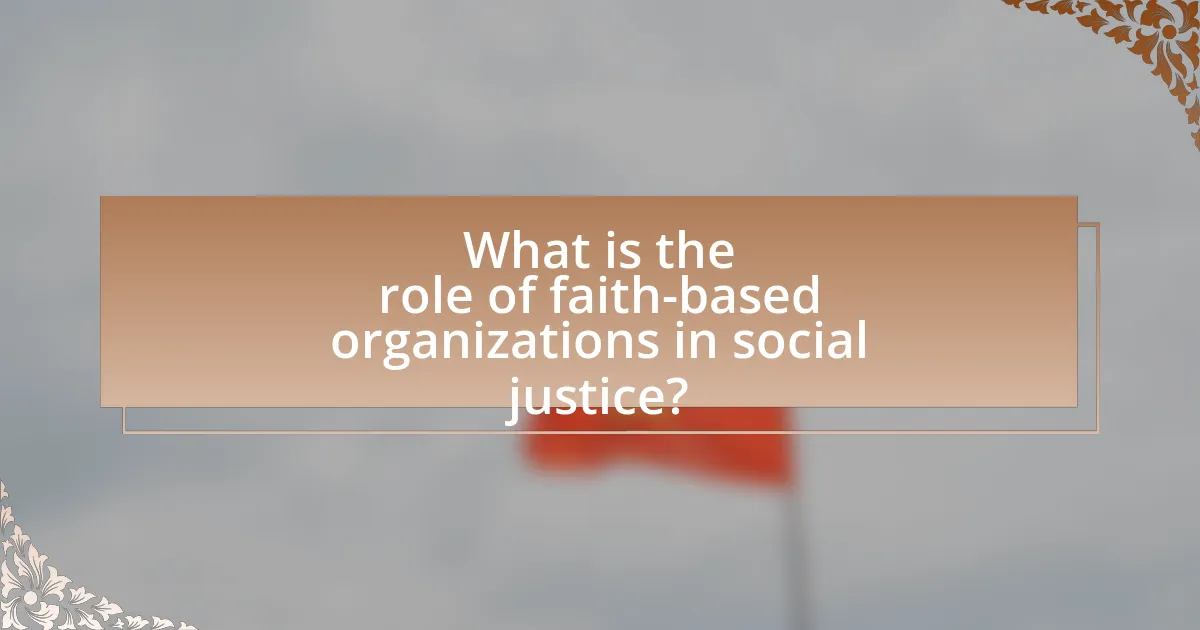
What is the role of faith-based organizations in social justice?
Faith-based organizations play a crucial role in social justice by advocating for marginalized communities and addressing systemic inequalities. These organizations often mobilize resources, provide social services, and engage in advocacy efforts that align with their moral and ethical beliefs. For instance, many faith-based groups participate in initiatives aimed at poverty alleviation, education, and healthcare access, which are essential components of social justice. Research indicates that faith-based organizations are instrumental in grassroots movements, as they leverage their networks to influence policy changes and promote social equity. Their involvement has been documented in various studies, highlighting their effectiveness in community organizing and mobilization for social change.
How do faith-based organizations contribute to social justice initiatives?
Faith-based organizations contribute to social justice initiatives by mobilizing communities, advocating for policy changes, and providing essential services to marginalized populations. These organizations often leverage their moral authority and community networks to raise awareness about social injustices, such as poverty, discrimination, and inequality. For instance, the Interfaith Coalition for Immigrant Rights has successfully influenced local policies to protect immigrant communities, demonstrating the impact of faith-based advocacy. Additionally, faith-based organizations frequently offer food banks, shelters, and educational programs, directly addressing the needs of vulnerable groups and fostering social equity. Their holistic approach combines spiritual guidance with practical support, making them vital players in the pursuit of social justice.
What specific social justice issues do faith-based organizations address?
Faith-based organizations address a variety of specific social justice issues, including poverty alleviation, racial equality, gender justice, environmental stewardship, and access to healthcare. These organizations often mobilize resources and advocate for policies that support marginalized communities, reflecting their commitment to social equity. For instance, according to a report by the Pew Research Center, 55% of religious organizations engage in charitable activities aimed at reducing poverty, demonstrating their active role in addressing economic disparities. Additionally, faith-based groups frequently participate in movements for racial justice, as seen in their involvement in campaigns like Black Lives Matter, which seek to combat systemic racism and promote equality.
How do faith-based organizations mobilize communities for social justice?
Faith-based organizations mobilize communities for social justice by leveraging their networks, values, and resources to advocate for systemic change. These organizations often engage in grassroots organizing, providing platforms for community members to voice their concerns and participate in collective action. For instance, many faith-based groups conduct outreach programs that educate members about social justice issues, such as poverty and discrimination, thereby fostering a sense of responsibility and urgency to act. Additionally, they frequently collaborate with other community organizations and coalitions to amplify their impact, as seen in initiatives like the Interfaith Coalition for Immigrant Rights, which unites diverse faith communities to advocate for equitable immigration policies. This collaborative approach not only strengthens community ties but also enhances the effectiveness of their advocacy efforts.
Why are faith-based organizations important in the social justice landscape?
Faith-based organizations are important in the social justice landscape because they often serve as catalysts for community mobilization and advocacy. These organizations leverage their moral authority and community trust to address systemic inequalities, promote social change, and provide essential services to marginalized populations. For instance, a study by the Pew Research Center found that faith-based groups are frequently involved in humanitarian efforts, such as disaster relief and poverty alleviation, which directly contribute to social justice initiatives. Additionally, faith-based organizations often engage in policy advocacy, influencing legislation on issues like immigration reform and healthcare access, thereby amplifying the voices of those who are often unheard.
What unique perspectives do faith-based organizations bring to social justice?
Faith-based organizations bring a moral and ethical framework to social justice that emphasizes compassion, community, and the inherent dignity of every individual. These organizations often advocate for marginalized populations based on religious teachings that promote social equity and justice, such as the principles found in the teachings of various faiths that call for caring for the poor and oppressed. For instance, many faith-based organizations engage in direct service and advocacy, addressing issues like poverty, discrimination, and human rights violations, which are rooted in their spiritual beliefs. Their unique perspective is further reinforced by their ability to mobilize communities, drawing on a network of followers who are motivated by shared values and a sense of collective responsibility. This mobilization can lead to significant social change, as seen in historical movements like the Civil Rights Movement in the United States, where faith leaders played pivotal roles in advocating for justice and equality.
How do faith-based organizations build trust within communities?
Faith-based organizations build trust within communities by engaging in consistent, transparent, and compassionate service. These organizations often provide essential services such as food assistance, healthcare, and educational programs, which directly address community needs and demonstrate their commitment to the well-being of residents. For instance, a study by the Pew Research Center found that 70% of Americans believe that faith-based organizations contribute positively to their communities, highlighting their role in fostering social cohesion. Additionally, faith-based organizations often create safe spaces for dialogue and support, allowing community members to express their concerns and needs, further solidifying trust.
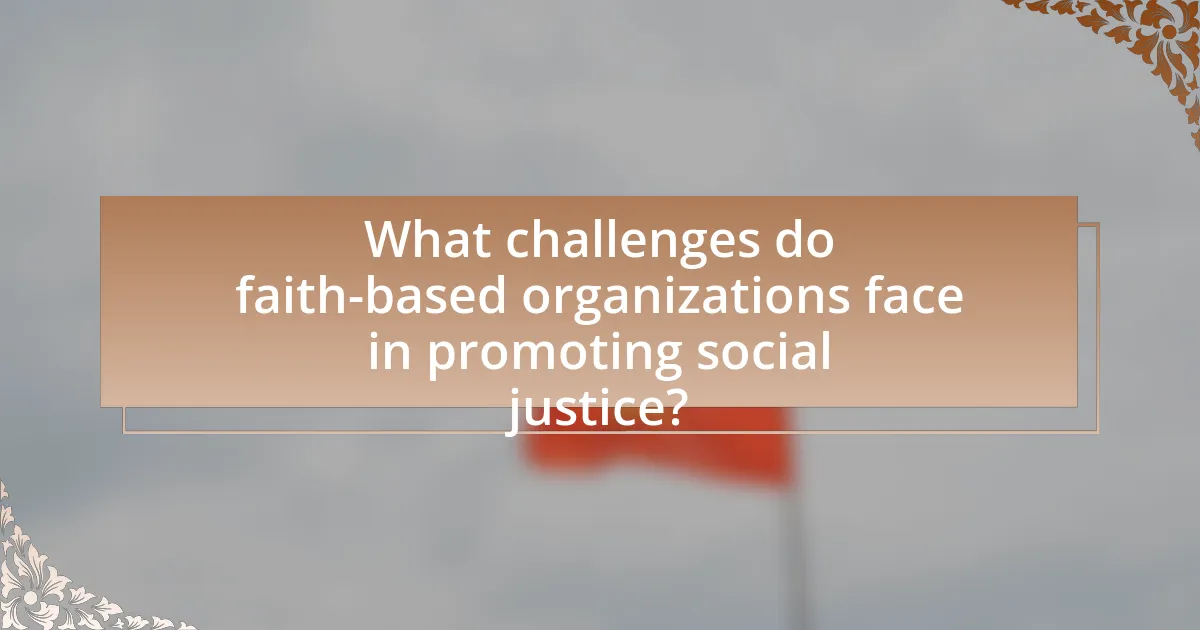
What challenges do faith-based organizations face in promoting social justice?
Faith-based organizations face several challenges in promoting social justice, including limited resources, internal conflicts, and external opposition. Limited financial and human resources often hinder their ability to implement large-scale initiatives effectively. Internal conflicts can arise from differing interpretations of religious teachings, which may lead to disagreements on social justice priorities. Additionally, external opposition from political entities or secular organizations can create barriers to collaboration and support. For instance, a study by the Pew Research Center in 2020 highlighted that 60% of faith-based organizations reported facing challenges in securing funding for social justice projects due to political polarization. These factors collectively impede the effectiveness of faith-based organizations in advancing social justice initiatives.
How do funding and resource limitations impact their efforts?
Funding and resource limitations significantly hinder the efforts of faith-based organizations in social justice initiatives. These constraints restrict their ability to implement programs, provide services, and mobilize communities effectively. For instance, a study by the Stanford Social Innovation Review found that organizations with limited funding often struggle to maintain staff, leading to reduced outreach and support capabilities. Additionally, resource shortages can limit access to essential tools and technologies, which are crucial for effective advocacy and service delivery. Consequently, these limitations can diminish the overall impact of faith-based organizations in addressing social justice issues.
What strategies can faith-based organizations use to overcome funding challenges?
Faith-based organizations can overcome funding challenges by diversifying their funding sources. This includes seeking grants from government programs, private foundations, and corporate sponsorships, as well as engaging in fundraising activities and building partnerships with other organizations. For instance, a study by the Lilly Family School of Philanthropy found that organizations that actively pursue multiple funding streams are more resilient during economic downturns. Additionally, leveraging community support through crowdfunding and social media campaigns can enhance visibility and attract donations. By implementing these strategies, faith-based organizations can create a sustainable financial model that supports their social justice initiatives.
How do political and social opposition affect their initiatives?
Political and social opposition significantly hinders the initiatives of faith-based organizations in social justice by creating barriers to collaboration and resource allocation. When these organizations face opposition from political entities, such as government policies that restrict their activities or funding, their ability to implement programs is directly compromised. For instance, in the United States, the 2017 executive order that limited federal funding for certain social services disproportionately affected faith-based organizations that relied on government grants for their initiatives. Additionally, social opposition, such as public backlash against specific social justice causes, can lead to decreased community support and participation, further undermining the effectiveness of these organizations. This dynamic illustrates how both political and social factors can create an environment that stifles the mission and impact of faith-based organizations in promoting social justice.
What role does interfaith collaboration play in social justice efforts?
Interfaith collaboration plays a crucial role in social justice efforts by uniting diverse religious communities to address systemic inequalities and promote social change. This collaboration fosters dialogue and understanding among different faith traditions, enabling them to collectively advocate for marginalized populations. For instance, initiatives like the Interfaith Alliance have successfully mobilized various religious groups to campaign against discrimination and promote human rights, demonstrating the effectiveness of unified action in achieving social justice goals.
How can different faith traditions work together for social justice?
Different faith traditions can work together for social justice by forming interfaith coalitions that unite diverse religious communities around common social justice goals. These coalitions can leverage shared values, such as compassion and justice, to address issues like poverty, discrimination, and environmental degradation. For instance, the Interfaith Alliance, which includes various religious groups, has successfully advocated for policies promoting equality and human rights, demonstrating the effectiveness of collaborative efforts. Additionally, joint community service projects, such as food drives or housing initiatives, can foster relationships and build trust among different faith groups, further enhancing their collective impact on social justice issues.
What are the benefits of interfaith partnerships in addressing social issues?
Interfaith partnerships provide numerous benefits in addressing social issues, including enhanced collaboration, increased resource sharing, and broader community engagement. These partnerships unite diverse religious groups, allowing them to pool their resources and expertise to tackle complex social challenges such as poverty, discrimination, and environmental sustainability. For instance, a study by the Pew Research Center found that interfaith initiatives can lead to greater social cohesion and understanding among different communities, which is essential for effective problem-solving. Additionally, interfaith collaborations often attract a wider audience, fostering inclusivity and encouraging participation from individuals who may not identify with a single faith tradition. This collective approach not only amplifies the impact of social justice efforts but also promotes dialogue and mutual respect among various cultural and religious backgrounds.
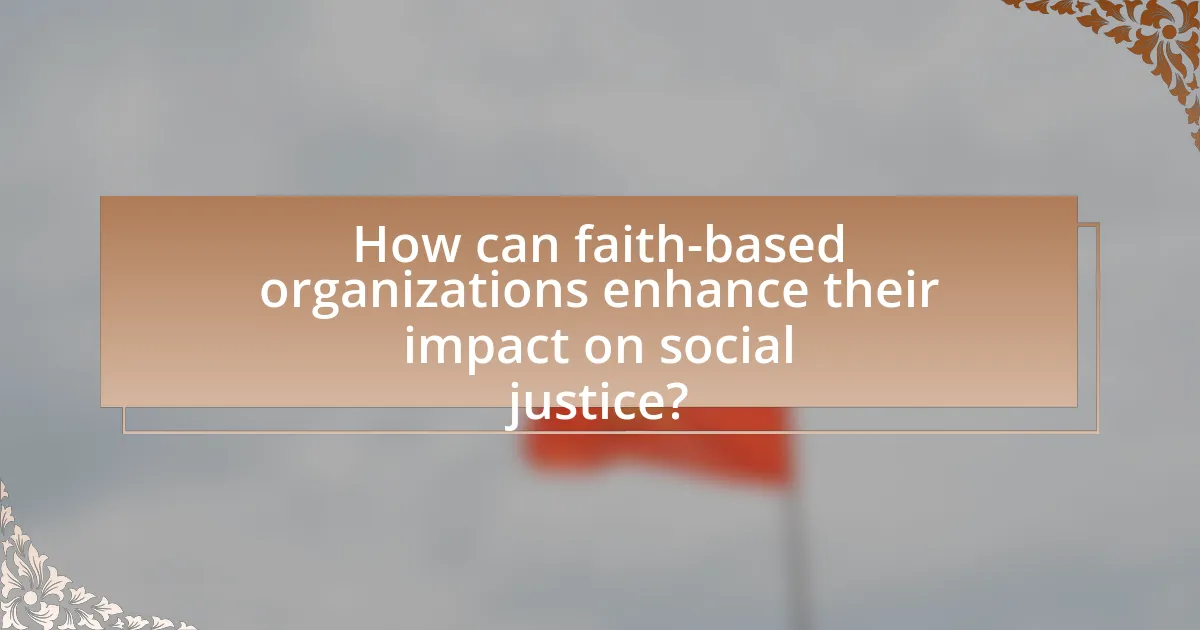
How can faith-based organizations enhance their impact on social justice?
Faith-based organizations can enhance their impact on social justice by mobilizing community resources, advocating for policy changes, and fostering inclusive dialogue. These organizations often have established trust within communities, allowing them to effectively identify and address local social justice issues. For instance, the Catholic Church’s network has historically played a significant role in advocating for immigrant rights and poverty alleviation, demonstrating their capacity to influence public policy and community action. Additionally, faith-based organizations can leverage their platforms to raise awareness and educate their congregations about social justice issues, thereby creating a more informed and active community.
What best practices can faith-based organizations adopt for effective advocacy?
Faith-based organizations can adopt several best practices for effective advocacy, including building coalitions, engaging in community education, and leveraging their moral authority. Building coalitions with other organizations enhances collective impact, as seen in initiatives like the Interfaith Alliance, which unites diverse faith groups to advocate for social justice issues. Engaging in community education empowers members and the public, fostering informed discussions on critical issues, as demonstrated by programs like the Faith in Action network, which trains faith leaders to address local concerns. Leveraging moral authority allows these organizations to influence public policy and opinion, evidenced by the role of religious leaders in the Civil Rights Movement, where their voices were pivotal in advocating for justice and equality.
How can faith-based organizations leverage technology for social justice?
Faith-based organizations can leverage technology for social justice by utilizing digital platforms to mobilize communities, raise awareness, and advocate for policy changes. For instance, social media campaigns can effectively disseminate information about social justice issues, reaching a broader audience and engaging supporters. Additionally, online fundraising tools enable these organizations to gather resources for initiatives that address social inequities. Research shows that organizations using technology for advocacy have increased their outreach and impact; for example, the Pew Research Center reported that 69% of Americans believe social media is an effective tool for activism. By integrating technology into their strategies, faith-based organizations can enhance their efforts in promoting social justice.
What role does education play in empowering faith-based organizations for social justice?
Education plays a crucial role in empowering faith-based organizations for social justice by equipping them with the knowledge and skills necessary to advocate effectively for marginalized communities. Through educational programs, these organizations gain insights into social issues, legal frameworks, and advocacy strategies, enabling them to address injustices more effectively. For instance, studies have shown that faith-based organizations that engage in training on social justice issues are more likely to mobilize their communities and influence policy changes. This empowerment through education fosters a deeper understanding of systemic inequalities, allowing faith-based organizations to become more effective agents of change in their communities.
What are some successful examples of faith-based organizations in social justice?
Successful examples of faith-based organizations in social justice include the American Friends Service Committee (AFSC), which has been active since 1917 in promoting peace and social justice through humanitarian efforts. The AFSC has worked on issues such as racial justice, economic equity, and immigrant rights, demonstrating its commitment to social change. Another notable organization is the Catholic Campaign for Human Development (CCHD), which focuses on poverty alleviation and community empowerment in the United States. CCHD funds local initiatives that address systemic issues affecting low-income communities, showcasing its impact on social justice. Additionally, the Islamic Relief Worldwide has provided disaster relief and development programs in over 40 countries, emphasizing social justice through humanitarian aid and advocacy for marginalized communities. These organizations exemplify the significant role faith-based entities play in advancing social justice initiatives.
How have specific faith-based organizations made a difference in their communities?
Specific faith-based organizations have made a significant difference in their communities by addressing social issues such as poverty, education, and healthcare. For instance, organizations like Catholic Charities provide essential services, including food assistance and housing support, which have helped millions of individuals and families in need. According to the U.S. Conference of Catholic Bishops, Catholic Charities served over 10 million people in 2019 alone, demonstrating their extensive impact on community welfare. Similarly, the Salvation Army offers programs focused on rehabilitation, emergency assistance, and youth services, contributing to community stability and individual empowerment. Their annual reports indicate that they assist over 30 million people in the United States each year, showcasing their role in fostering social justice and community support.
What lessons can be learned from successful faith-based social justice initiatives?
Successful faith-based social justice initiatives demonstrate the importance of community engagement and collaboration. These initiatives often mobilize diverse groups, fostering partnerships between religious organizations, local communities, and secular entities to address social issues effectively. For instance, the Interfaith Coalition for Immigrant Rights in the United States successfully united various faith groups to advocate for immigrant rights, showcasing how collective action amplifies impact. Additionally, these initiatives highlight the significance of integrating spiritual values with social action, as seen in the work of organizations like Sojourners, which combines faith teachings with advocacy for economic justice. This approach not only motivates participants but also resonates with broader audiences, enhancing outreach and support.
What practical steps can faith-based organizations take to improve their social justice efforts?
Faith-based organizations can improve their social justice efforts by actively engaging in community outreach programs that address local needs. These organizations can establish partnerships with local nonprofits and government agencies to identify specific social issues, such as poverty, education, and healthcare disparities. For instance, a study by the Pew Research Center indicates that faith-based organizations often have strong community ties, which can be leveraged to mobilize resources and volunteers effectively. Additionally, they can provide educational workshops on social justice topics, fostering awareness and advocacy among their congregations. By integrating social justice themes into their sermons and teachings, faith-based organizations can inspire their members to take action, thereby amplifying their impact on social issues.
